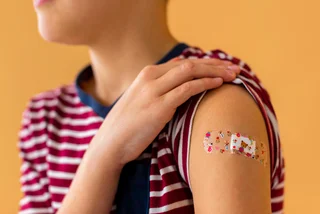From Prague’s frustrating pediatrician shortage to the impacts screen time is having on preschoolers and adolescents, we delved into some of the most pressing concerns facing parents today with Dr. Magdalena Kreimová.
A certified Czech pediatrician with nearly 20 years of experience in private clinics as well as the children’s ward at Bulovka Hospital in Prague 8, Dr. Kreimová recently joined the pediatric staff at Concierge Medicine, a private medical clinic that opened its second office in Smíchov earlier this year.
We spoke to Dr. Kreimová about vaccinations, the importance of outdoor play, and how Concierge Medicine’s approach is empowering parents to be strong partners in their children’s healthcare journey.
A lot of parents are struggling to find pediatricians in Prague taking new patients. What advice do you have for them?
This is not a new problem. There are unfortunately not enough people studying to be pediatricians in the Czech Republic, as a result, many families are crowding the children’s departments and emergency rooms of local hospitals. The doctors there are overworked, and hospitals can’t provide families with preventative check-ups or regular vaccinations.
This is one of the big reasons why so many families – especially expat families – are turning to private clinics, like Concierge Medicine, where they are met with open-minded doctors who will give them the time they need to have thorough discussions about their children’s healthcare, and not the five minutes you’d normally get in a public medical office. This was not the case 15 years ago, when there were few private clinics on the market and even fewer options for parents struggling to find a doctor for their kids.
You recently joined Concierge Medicine. Why is this clinic a good fit for you?
The philosophy of the company is very close to my heart. Jana Yanová, the medical director, is my schoolmate from university. We are a small group. We are a family, and we treat our patients like family. We focus on giving our patients personalized care, and in the pediatric department see parents as our partners, Our goal is preventive medicine and promoting healthy lifestyles.
You’ve called your nurse a vital team player. Can you explain the role nurses play in children’s healthcare?
My nurse Zuzka is one of the reasons I came to Concierge Medicine. We work very closely together and know what to expect from each other. It’s very important to have an experienced nurse in this field. Pediatric nurses – which there is a worldwide shortage of – are often the first ones to see the patients. They perform what’s called in the pediatric field a “big hug” – greeting the families, putting children at ease by playing with them, smiling at them, easing their nerves. These “big hugs” help kids relax so that parents can easily have important conversations with their children’s doctor. Nurses do a big, big job.
What are the benefits of registering your child at a private clinic, like Concierge Medicine?
The most important thing is the time we spend with families. If parents feel like they have time to explain what’s going on with their child, they can express themselves clearly, and we can reach a conclusion faster. We have time for discussions. This is not possible in public medical offices.
Without really listening to families, I don’t think we can treat our patients well. The healthcare of children, I believe, needs to be about good communication with families.
We have a lot of specialists at Concierge for children, like an ENT specialist, orthopedist, radiologist, and an allergist, and we cooperate with a children’s psychologist and psychiatrist. When we don’t have an in-house specialist on hand, we will help the family make an appointment with a doctor at a hospital in the city center. I like to call the doctor myself and explain the situation to them on behalf of the family.
You've been in the medical profession for 30 years. How have pediatric services changed in the Czech Republic throughout your tenure?
Information technologies have changed the way we work. We can easily look up the information we need in scientific databases. We can look up how certain diseases are being treated aboard. We can get an overview of all the treatments available. We are trying to use it in the everyday practice of evidence-based medicine. We have clear data, which is supporting our daily decisions in the medical office. I think this is a big change.
Colleagues are also collaborating even more than before. We aren’t shy about asking for second opinions. I like to discuss cases with my colleagues if I am not sure about something.
A growing concern among pediatricians – not to mention educators and the WHO – is the amount of “screen time” young children are exposed to. What are your thoughts on this?
I think every young family should read the document put out on this topic by the WHO. They offer very easy, simple recommendations about how to handle screen time with preschoolers. If kids are exposed to too much screen time, it can affect their way of thinking, of feeling, of how to behave in social situations. We don’t want computers to form our small kids. Kids who are in front of screens too much aren’t learning how to act in normal daily life. Screen time influences their social interactions.
At the preschool age, we need to focus on social interactions – how kids are acting with each other. If we expose them to too many passive techniques, they won’t learn how to interact with others. Screen time is very simple, but real-life interactions are very complicated, because we are different, and we need to be very flexible; we need to be able to react to what someone is telling us. Real-life human interaction is very energy-consuming, but it’s forming our kids' personalities.
Screens are also taking a toll on vulnerable adolescents. They do compare themselves with their peers too much. If the young generation would go outside more, and interact with each other personally, if this would happen, there would be fewer mental health struggles. I think many teenagers are very isolated. They don’t talk about their values, and then they end up getting sick.
Let's talk vaccinations. Parents moving here from abroad -- what do they need to know about vaccination schedules?
Up to three years of age, we have very similar vaccination schedules in the Czech Republic as in other countries in Europe. There are just tiny differences. The official recommendation by the European medical authorities is that you can combine a lot of vaccines, which I don’t like to do. I am very conservative. I like to give one shot and wait a bit before giving a second shot. But both ways are possible. We have a lot of voluntary vaccines – like vaccinations for rotaviruses, chicken pox, and tick-borne encephalitis.
We are moving into winter when respiratory infections run rampant. What preventive measures can parents take to protect their kids?
It sounds silly, but I would say if kids would eat fresh fruits and vegetables, not synthetic vitamins, if they would go outside a lot, enjoying the company of family members, they would sleep a lot, I think they would be protected. It’s good to make sure to keep your Vitamin D level up. We found that in the last two years – I think it was in connection with the Covid era – many people were low on Vitamin D. I think it was because they didn’t go outside too much. Going outside is the best medicine.
This article was written in association with Concierge Medicine Europe. Read more about our partner content policies here.












 Reading time: 6 minutes
Reading time: 6 minutes 






















